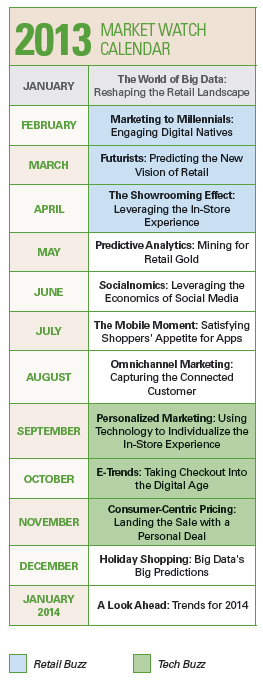Millennials (often referred to as digital natives) are the single largest generation in the U.S.— representing 25 percent of the U.S. population and more than $200 billion in annual buying power. More than 80 million strong, Millennials (generally qualified as those born between 1977 and 1995) define themselves by their connectedness, culture and influence over their friends. They insist on truth in advertising and authenticity in experiences. They require simplicity and care about their communities. Born in an era of technology, Millennials have grown up with computers and the Internet and are the first generation to be constantly connected. This connectedness affects the way they think, interact and shop—and it radically changes the way retailers and CPGs must market to the now undeniable future of retail.
With Millennials, the defining moment starts in the digital world. According to The Boston Consulting Group, over 50 percent of Millennials explore brands on social media sites. They are more likely to seek and share information on these sites—and to have more confidence based on what friends and peers say over messages delivered by traditional advertising. This means it is essential for brands and retailers to build a foundation of trust with this high disposable income target population. A responsibility exists to provide consistency in the experience––from the name on the outside of the store to the experience with associates to the packaging on the products. This will resonate with Millennials and increase the likelihood of garnering positive online reviews, which 87 percent of shoppers say help confirm their decision to purchase, according to Cone Communications. Conversely, neglecting to do so can generate negative reviews, which 80 percent of shoppers say can push them not to buy a product.
— American Express
“Just be who you are, be authentic, be transparent, be simple. Those are the things that tend to resonate with Millennials,” says Dwayne Chambers, CMO of Krispy Kreme Doughnut Corporation.
Mobile technologies are an absolute necessity to remain relevant amongst Millennials. According to Supermarket News, 40 percent of Millennials who are responsible for the majority of household shopping rely on smartphones or tablets to research products in-store (as compared to 21 percent of non-Millennials). The more progressive retailers and brands are capitalizing on this trend by creating mobile apps or sites that offer discounts, customer reviews, product information and/or the ability to create customized shopping lists. In addition, according to a survey by American Express, over half of Millennials are interested in trying new technology-enabled payment tools such as digital wallets (compared with only 23 percent Baby Boomers), suggesting that the fate of emerging payments lies squarely in the hands of Millennials.
 Chambers also recently commented that having personal connections with customers is one of the most successful ways they have found to market to younger people. “It seems counterintuitive to us because everything seems impersonal… but the ability for us to really connect with people and connecting through those things [social media, email, etc.] are essential. Millennials are very connected and it is all very personal for them.”
Chambers also recently commented that having personal connections with customers is one of the most successful ways they have found to market to younger people. “It seems counterintuitive to us because everything seems impersonal… but the ability for us to really connect with people and connecting through those things [social media, email, etc.] are essential. Millennials are very connected and it is all very personal for them.”
While technology is undeniably central in digital natives’ lives, brands and retailers must also take steps to appeal to them beyond the screen. According to Supermarket News, Millennials love shopping more than any other generation—including food shopping— and for them, experience is king.
“Millennials trust brands and tend to be most impressed with brands where the store associate can connect with them,” says Executive Vice President of Barkley Jeff Fromm, an expert in Millennial advertising. “Store associates play a very important role and the highest performing brands have store associates who can actually deliver that trust.”
Millennials also love to discover new products and ways of using them. To capitalize on this, brands and retailers are turning the in-store experience into an adventure of discovery—for example, through in-store product demonstrations, cooking or wine pairing classes and other special events. According to President and CEO of Kings Food Market Judy Spires in an interview with Supermarket News, “Millennials want… to be the first to taste [new foods] and tell their friends about them. [At Kings, we created] a cooking school that gives the opportunity to take it a little deeper and enjoy the ability to experiment with a lot of new tastes… Millennials are jumping on every opportunity.”
It’s not just Millennials these types of marketing efforts stand to capture. According to a study by Edelman, 7 out of 10 Millennials consider themselves “alpha-influencers,” believing not only that they influence the decisions of friends and family but also that they have a responsibility to share their brand and retail experiences via social media and other channels. Providing an engaging and interactive experience for Millennials, therefore, has the potential to create a resounding positive influence on consumers of all generations.
The message is clear: Millennials are a dominant force craving the exciting and new—not only in product choice, but also in the way they communicate. Brands and retailers are obligated to act now to embrace the technology, social media and experiential marketing these digital natives demand as they enter their peak earning and spending years and cement themselves as the largest and most influential group of retail consumers.

